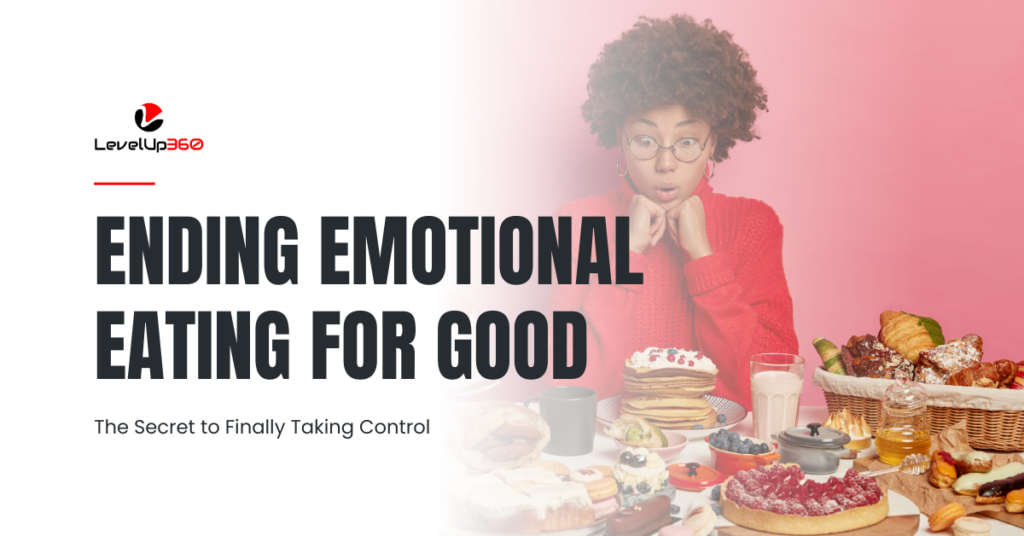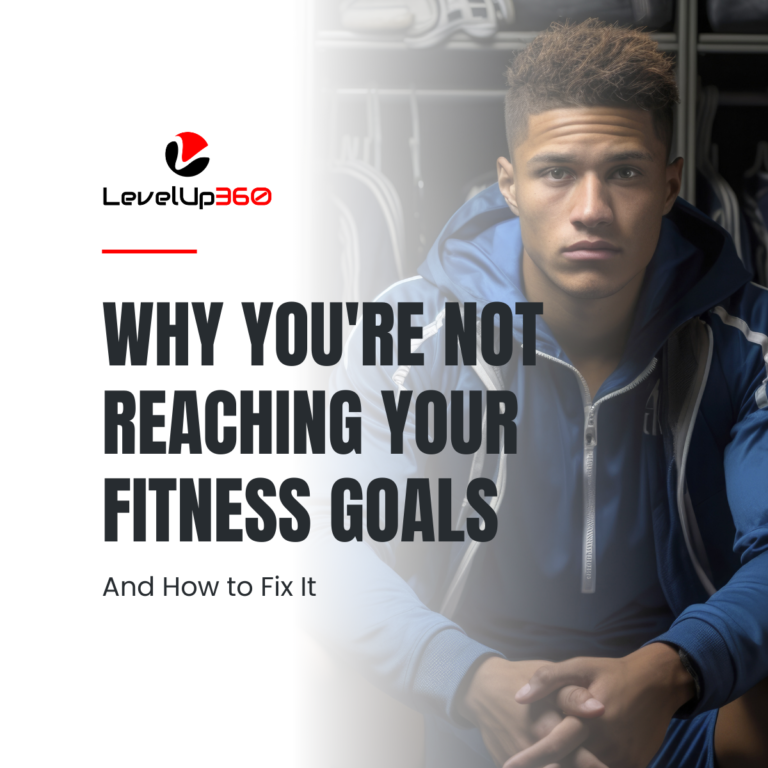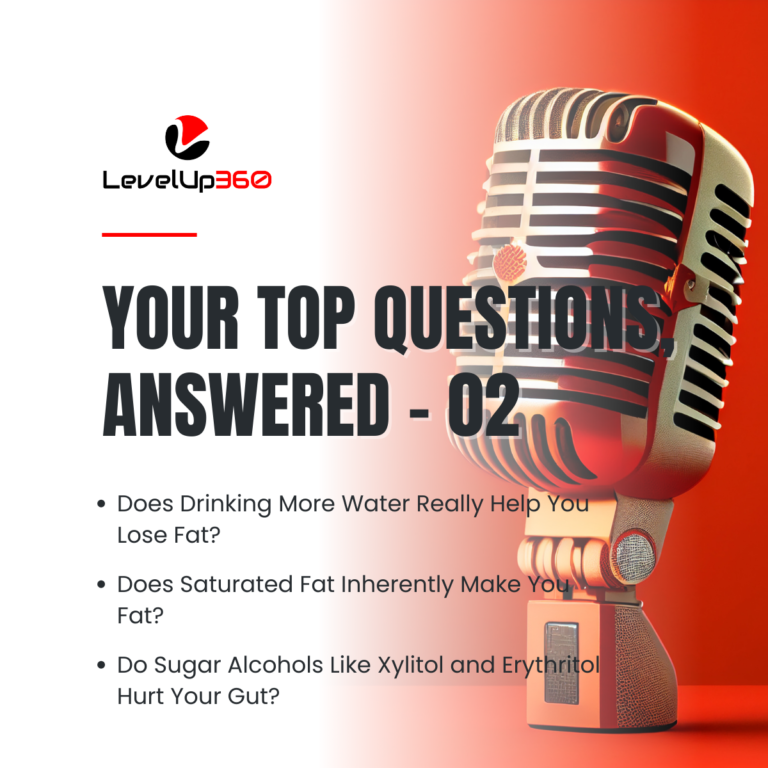
Ending Emotional Eating for Good: The Secret to Finally Taking Control
We’ve all been there – a stressful day at work leads to polishing off a whole pizza alone. An argument with your spouse causes you to raid the freezer for ice cream. Emotional eating is incredibly common, but keeping this habit makes improving your nutrition and body composition nearly impossible.
When we rely on food to numb or distract from difficult emotions, it prevents sustainable fat loss. Attempts to lose weight stall as we cope with life’s inevitable struggles by burying our feelings under layers of lasagna. This starts a vicious cycle of yo-yo dieting that impedes results.
But emotional eating doesn’t just sabotage your fitness goals. Suppressing emotions with food actually creates bigger issues mentally and emotionally down the road. Like attempting to duck underwater to avoid the rain, you can’t hide from feelings forever. And trying to do so causes them to leak out in other unhealthy ways.
By cultivating self-compassion through sitting with discomfort and journaling, you deepen self-knowledge and align your actions with your true values.
The Vicious Cycle of Emotional Eating
Reaching for food in response to emotions is a reflexive habit for many. When we feel sad, stressed, lonely, or experience any unpleasant state, eating becomes an automatic coping mechanism. This provides a short-term mood boost from dopamine but leaves the underlying issue unresolved.
Over time, an association develops in the brain between food and feeling better – similar to how addiction pathways form. We subconsciously learn eating helps numb our pain, at least temporarily. This provides relief in the moment but doesn’t address the root cause.
The result? Getting stuck in an endless loop of using food to cope with difficult emotions. Any progress with health and fitness goals quickly stalls out as we lean on our addiction each time life feels challenging. Until we break this cycle, sustainable change remains elusive.
Why We Reach for Food When Feeling Low

We turn to food when experiencing unpleasant emotions because eating provides immediate mood enhancement. The tastes we crave trigger dopamine release, giving us a brief high. Food helps distract us from the real issues we face in the short term. Over time, eating becomes ingrained and is the only coping mechanism we know of.
The food industry taps into these vulnerabilities, engineering processed products to hijack the brain’s reward system. They combine the perfect balance of salt, fat, and sugar to make foods irresistible, despite lacking real nutrition. As emotional eaters, we are not just fighting our own habits – but billion-dollar companies using science to make eating addictive.
Have you ever mindlessly reached for a bag of chips while watching TV, only to look down and realise it’s empty? The food industry intentionally creates these “can’t eat just one” products by hijacking our natural reward circuits. They load up foods with as much addictive fat, sugar and salt as possible to keep us coming back for more.
Damaging the Inner Child
Beneath the surface, emotional eating damages our psyche in invisible but insidious ways. Each time we reach for food to avoid emotion, we send a clear message to the vulnerable inner child within: “You are not allowed to feel when you’re with me.”
Imagine a toddler falls and scrapes their knee. They look to you with tearful eyes, wanting comfort from their trusted parent. But instead of a loving hug, you scold the child for crying and distract them with candy. This seems unthinkable, yet it’s what we do to ourselves when we deny our inner selves compassion.
If a child is consistently told their emotions are unacceptable, that inner child begins to act out. Tantrums, misbehaviour and rebellion often surface. In the same way, our denied emotions manifest through self-sabotaging actions like abandoning fitness goals, binge eating, or giving up entirely when progress stalls.
To heal this fragmentation inside, we must embrace all aspects of ourselves with the unconditional love a nurturing parent provides. Only then can we address the root causes behind why we really reach for food when we’re struggling emotionally.
Holding Space
Ending emotional eating requires a radically different approach. We first must make space to fully experience our emotions without judgment or suppression. This is understandably uncomfortable at first. We’ve trained ourselves to avoid feeling badly at all costs, equating it with weakness.
Here are two powerful, scientifically proven techniques to start holding space for your emotions rather than blocking them out:
1. Sitting with Difficult Emotions
Allowing ourselves to fully feel anger, sadness, loneliness, anxiety or any other emotion seems counterintuitive. But welcoming them in is the only way to release their grip on us. Think of it like facing a fear head-on. The simple act of shining light on any darkness strips it of its control.
When feeling low, take 5-10 minutes in a quiet space to close your eyes and let the emotions flow freely without resistance. Notice how they shift and evolve when you grant them space. Simply experience each moment with openness and curiosity, like watching clouds pass by. Difficult states are impermanent – they dissipate rapidly when embraced.
Could allowing yourself to fully feel an emotion like anger actually lessen its control over you? Try a short experiment next time you feel upset – simply close your eyes, drop resistance, and let the feeling wholly fill you.
2. Journaling for Emotional Release
Writing down continuous, stream-of-consciousness thoughts and feelings provides an outlet to empty what burdens our minds. The process of translating emotions into language produces therapeutic benefits rivalling talk therapy.
To begin, set a timer for 5-15 minutes and start writing whatever arises within. Declutter your psyche by allowing it all to spill out – negativity, positivity, confusion. Follow each thread without self-judgment wherever it leads. Discard or shred the paper after, allowing those feelings to fully released.
Have you ever felt lighter after venting your feelings to a trusted friend? Putting your emotions down on paper can provide the same relief. Releasing them from your mind frees up mental bandwidth previously occupied by buried feelings.
Promoting Self-Discovery with Questions
A simple yet powerful tool to build emotional mindfulness is asking yourself “What do I feel right now?” throughout the day. Treat it as an open-ended exploration, letting the wisdom within guide you organically.
Other helpful prompts include:
- Why am I craving this food? Am I truly hungry?
- What emotion am I avoiding by wanting to eat?
- If my inner child could speak, what would they say?
- How does my body feel when I pause to breathe?
- What do I need right now to feel nurtured?
By making a habit of checking in with your deepest self, you unravel the roots of unconscious patterns. Your inner compass realigns with purpose as awareness illuminates the way.
Trying These Techniques for Yourself
We’ve outlined two methods – sitting with emotions and journaling – to hold space for difficult feelings that normally get suppressed through emotional eating. But theory means little until put into practice.
Here are some simple ways you can start applying these techniques for yourself:
- Next time you crave food for emotional reasons, pause and ask “What am I really feeling right now?” See what emerges.
- Set a timer for 10 minutes. Close your eyes, breathe deeply, and let any emotions arise and move through you. Observe without judgment.
- Grab a notebook and stream-of-consciousness write about your current emotional state for 5+ minutes. Let it flow raw and unfiltered.
- When you notice an urge to eat but aren’t truly hungry, use it as a reminder to check in with yourself about what you really need at that moment.
- Anytime you feel an impulse to eat your feelings, try sitting or journaling first. See if the urge fades.
Start small and be patient with yourself. Over time, these practices will start to feel natural as your self-awareness deepens.
Conclusion

Implementing regular self-inquiry practices short-circuits the reflex to bury feelings under food. The space created dissipates destructive energies before they solidify as unhealthy habits. You tap into intuition and gain choice around when and what you eat.
While the ego fears examining the shadow, the wisest among us recognise darkness lived openly holds no real power. By cultivating self-compassion through sitting with discomfort and journaling, you deepen self-knowledge and align your actions with your true values.
Learning to hold space for our emotions may be one of the most vital life skills for improving all areas of life – including achieving health goals sustainably. By making space for the parts of ourselves we’ve tried to deny, we move forward integrated and whole.
Recommended reading
Recommended reading
Additional Resources
Feeling in control of your health
If you are interested in improving your health and wellness, check out other resources such as Our Blog, Free Resources and/or join our private Body-Mind Transformation Secrets Community on Facebook, and go on an even deeper dive with me to uncover how to succeed in your health and wellness goals.
You may also be interested in our Sleep Secrets Cheat Sheet. It is a great resource with strategies to fix and optimize your sleep which is crucial to succeeding in your health and wellness goals.
Resources
Pictures








